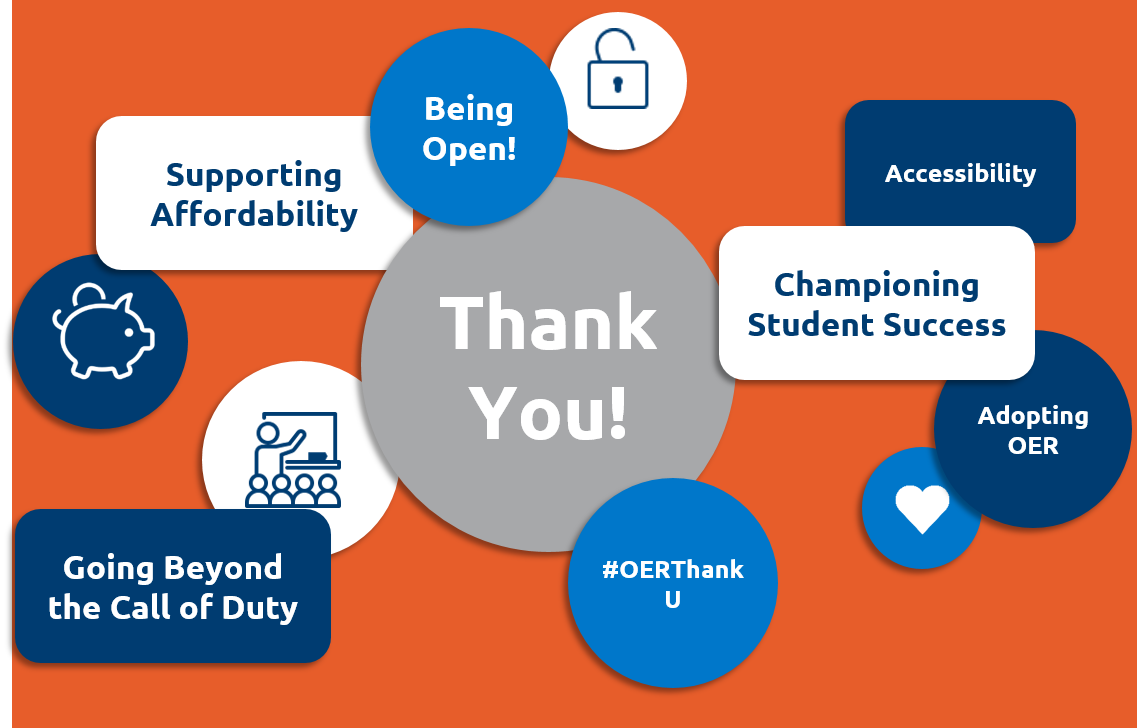#OERThankU
The #OERThankU campaign acknowledges faculty support in the open education movement at Ontario Tech. These dedicated instructors are some of the early adopters of OER. Faculty who have adopted or adapted OER for their classes are recognized with a small token of our appreciation, and are featured on this page and on social media.

Dr. Sharon Lauricella
Our second #OERThankU featured instructor is Dr. Sharon Lauricella, Associate Professor and Undergraduate Program Director of Communication and Digital Media Studies at Ontario Tech's Faculty of Social Science and Humanities.
A creative and passionate educator, Dr. Lauricella is creating custom OER for her communications courses, which include Communication Ethics, Nonviolent Communication, and Public Speaking. Her unconventional teaching approaches mean that few traditional textbooks (if any) suit the course topics. The specific courses that use Dr. Lauricella's OER are available on our faculty adoptions page. Here is some of what Dr. Lauricella had to say about the process.
OER at Ontario Tech: Why did you decide to implement OER in your courses?
Dr. Lauricella: I employ a lot of creativity in my courses, which include Communication Ethics. Nonviolent Communication, Public Speaking, Practicum, and a new, alternative delivery elective that I'm offering this fall. Given the variety of topics that I cover in class, together with the depth with which I want students to engage and experience, I knew that there was no textbook that would suit these courses and my unconventional approach. One of the most important elements of my teaching is for students in my classes to engage with each other and form a community, and textbooks simply don't facilitate this kind of meaningful experience. My OER focus not just on students learning new information, but also on forming new and stronger bonds with one another. I can achieve this with OER, but not with a traditional, one dimensional textbook.
OER at Ontario Tech: What convinced you of the value of OER?
Dr. Lauricella: One of my favourite creatives is Austin Kleon. He says, "Do good work and share it with people." I see no reason that textbooks should cost students hundreds of dollars in every course and every term. I want to do good work and serve my students. I am at my best when I am sharing with students -- and sharing by definition does not incur a (financial) cost.
OER at Ontario Tech: What are some of the steps you took toward implementing OER?
Dr. Lauricella: I attended some workshops on campus -- the librarians are all rockstars and did a super job demonstrating the opportunities available for creating and publishing OER.
OER at Ontario Tech: What is one thing you wish you knew before beginning your journey with OER?
Dr. Lauricella: I am going to become very good at turning caffeine into words! In all seriousness, knowing how to use Wordpress really helped me to get going with the creative process of the materials, so I was grateful for having that skill already. I do wish I knew how much work it was going to be, though, because caffeine can only work for so long...
Dr. Joseph MacMillan
We are happy to share that Dr. Joseph MacMillan, Associate Teaching Professory and Undergraduate Program Director of Physics and Astronomy in the Faculty of Science at Ontario Tech.
Dr. MacMillan's use of OER are for a variety of physics and astromony courses. He has replaced the licensed, subscription-based homework/assessment system with an open-source program that is free for student use. The system contains mastery setting modules, as well as animated video solutions. The system has improved student learning (based on final exam results). Interested in which courses are using this system? Check out our faculty adoptions page. We had the chance to interview Dr. MacMillan to ask him a few questions about his thoughts on OER.
OER at Ontario Tech: Why did you decide to implement OER in your courses?
Dr. MacMillan: For a whole bunch of reasons: increasing frustration with student "cheating" online homework platforms; high student cost of using online homework platforms; growing awareness of education research that could point the way to a better learning experience for students while performing homework; government pressure to keep ancillary and hidden fees for students down; and a desire to build something cool for students.
OER at Ontario Tech: What convinced you of the value of OER?
Dr. MacMillan: I've been a proponent of open source since I first started using Linux in 1999, and I've always been uneasy with monetizing anything to do with learning. In my research field (astronomy), it's very rare to see data or code that isn't open and public. So it seemed natural to me that any platform will build for our courses should likewise be open, and LON-CAPA, being open source, was a perfect fit to build off of. It's not just about benefit to students, though -- I'm amazed that instructors are okay with building content for closed systems like Blackboard or textbook publisher-based websites, as they then have no control over that content. The site could shut down with no warning at any time and all content be lost.
OER at Ontario Tech: What are some of the steps you took toward implementing OER?
Dr. MacMillan: It was easy on our case -- LON-CAPA was already open source, and choosing to make our resources open was the default.

To report an adoption of OER for your classes, complete the brief form here.
To learn more about OER or to join the OER Stewards, please visit this page.